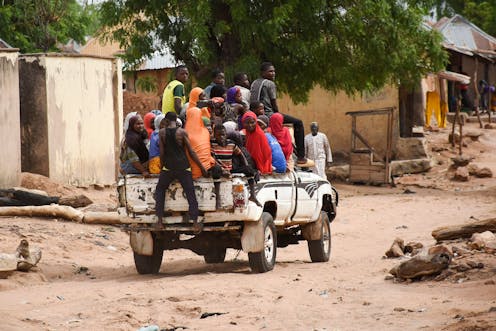
Violence and insecurity are plaguing the northern parts of Nigeria. Banditry, kidnapping and other forms of indiscriminate violence have risen sharply during the pandemic.
Read more: Toxic mix of bandits, arms, drugs and terrorism is alarming Nigerians: what now?
Conflicts over diminishing resources, religious extremism and identity continue as well.
These various forms of violence have heightened anxiety and limited movement for many Nigerians, impeding trade and further damaging an economy that’s reeling from pandemic fallout and inflation.
The Nigerian government’s response has remained largely ineffective. Violence continues to rise and there have been accusations of police brutality.
But there is hope that ways can be found to reduce the insecurity in this region.
In a study we ran with Mercy Corps, an international humanitarian and development agency, we examined whether training local leaders in mediation skills would improve their ability to resolve local disputes. The trainees included traditional chiefs, religious leaders, women and youth.
We found that mediation skills training improved local conflict resolution and reduced violence. Compared to leaders who did not receive training, trained leaders reported fewer violent events and higher perceptions of security. Moreover, so did the wider community.
This has implications for peacebuilding programmes seeking to prevent and stop violence worldwide.
Mediation of intercommunal disputes
In Plateau, Kogi, and Benue states in Nigeria, community leaders are involved in resolving local disputes over land, ethnic and family issues, as well as farmer-herder clashes.
The question was whether we could improve the way they already resolved disputes. We also looked at whether this type of training would change levels of violence and insecurity among those directly involved and in the wider community.
To train leaders to become more effective mediators, Mercy Corps used an approach called interest-based negotiation. The agency has used this method in numerous countries since 2004 – Kenya, Ethiopia and Mali among them. Interest-based negotiation encourages parties to find mutually acceptable outcomes by meeting all parties’ interests.
In Nigeria, the local leaders came together for three days of training.
To measure the effectiveness of the intervention, we compared leaders from 44 communities who received the training with leaders from 44 communities who didn’t. Additionally, to see if the training improved security for the community as a whole, we compared communities whose leaders received the training with those who did not.
We collected survey measures from leaders and community members in the treatment and control areas before the programme started and about one year after the leaders were trained.
Leaders who had received the training felt they had stronger conflict resolution skills, perceived fewer violent events and felt there was greater security in their communities. Trained leaders also said they talked to people from other groups more often. And they thought that leaders from different groups wanted to prevent violence and would be more likely to stick to an agreement.
This positive impact of the training extended to the wider community. In the year following mediation training for leaders, 29% of citizens in those communities reported experiencing a violent event. In comparison, 55% of citizens in communities where leaders had not received training said they had experienced violence during that same time period.
Nearly 53% of respondents in comparison communities reported feeling unsafe “often” or “always”, compared to only 32% of the respondents in intervention communities.
People in communities with trained leaders also reported interacting more with people from other communities. For example, they traded or socialised more frequently and travelled more freely than people in communities without trained leaders.
Communities may already trust local leaders more than they trust the government. Enhancing their mediation skills can mitigate violence and secondary economic effects. And training is relatively low-cost.
The training and mentoring of 340 leaders over the course of a year cost about US$60,000. This is significantly lower than the cost of security forces, policing migration routes, imposing fines and arresting people.
For example, to deal with the rising insecurity throughout the country, Nigeria increased its security budget by US$500 million, to a total of US$4.8 billion.
Useful approach in farmer-herder and other communal conflicts
These results should inform the efforts of international donor governments, the Nigerian government, and neighbouring countries like Mali, Benin, and Niger, to address the violence between farmers and herders.
Read more: What's triggered new conflict between farmers and herders in Nigeria
It points to ways these countries can mitigate violence without curtailing migration routes for herders (a common policy), impeding economic activity or risking further violence.
This type of intervention is applicable not just to farmer-herder conflict in West Africa but also in other parts of Africa.
Farmer-herder violence occurs across the Sahel and further south into Kenya, Uganda, and South Sudan.
It might also be useful for addressing other types of intercommunal violence, whether based on religion, ethnicity, or other identities. Divisions like these are seen in Ethiopia, Mozambique, and coastal West Africa, for example.
Preventing the escalation of violence between groups may also limit the ability of elites to use these divisions to mobilise support, as is the case in the civil war in South Sudan.
Read more: What cattle conflicts say about identity in South Sudan
Training leaders in mediation is not a complete or instant solution. It will not solve all the violence plaguing these communities.
But targeted investments in local leaders and their mediation skills can help prevent the escalation of disputes, break cycles of violence that have continued for generations, and build more peaceful communities.
Emmanuel Ogbudu, Monitoring and Evaluation Manager, Mercy Corps Nigeria and Catlan Reardon, a PhD student in Political Science at the University of California, Berkeley are co-authors of this article and the research.
Rebecca Jayne Wolfe worked for Mercy Corps from 2006-2020. She received funding from the Pearson Institute for the Study and Resolution of Global Conflicts for this work.
This article was originally published on The Conversation. Read the original article.







